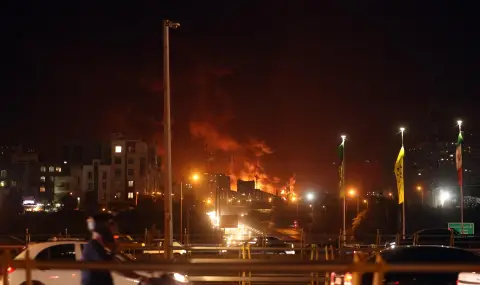Israel's surprise attack on Iran has the obvious goal of disrupting Iran's nuclear program and extending the time it takes to build a nuclear weapon. But the scale of the attacks, Israel's choice of targets and statements by Israeli politicians have suggested that Israel's ambitions are longer-term: overthrowing the regime in Tehran, Reuters notes, BTA writes.
The strikes, which began on Friday, were carried out not only on missile and nuclear sites, but also against key figures in Iran's military command structure and leading nuclear physicists, actions that are aimed at undermining Iran's authority both domestically and internationally (especially among regional allies) – factors that could ultimately destabilize the Islamic Republic's leadership, experts say.
“One could argue that one of the reasons Israel is doing this is that it hopes to achieve regime change,“ Michael Singh of the Washington Institute for Near East Policy and a former senior official in the administration of President George W. Bush told Reuters. "Israel would not mind the people of Iran rising up."
According to Singh, the argument that there is a deeper purpose is supported by the fact that Israel is trying to minimize civilian casualties.
On the other hand, immediately after the strikes began, Israeli Prime Minister Benjamin Netanyahu released a video message directly aimed at the Iranian people.
"The Islamic regime that has oppressed you for nearly 50 years threatens to destroy our country," Netanyahu said.
Israel's goal is to eliminate the nuclear and ballistic missile threats, he said, but added: "By achieving our goal, we are also paving the way for you to gain your freedom." The regime does not know where it came from or what is coming. It has never been weaker. This is your opportunity to rise up and make your voice heard.
But despite the damage done by the unprecedented Israeli strikes, decades of hostility towards Israel - not only among the ruling elite but also among the broad masses of Iran's predominantly Shiite population - have not been forgotten. calls into question the formation of sufficient public support to overthrow the well-entrenched theocratic leadership in Tehran, which has a loyal security apparatus, Reuters notes.
Singh warns that no one is yet able to say what the conditions and prerequisites would be for the growth of a strong opposition in Iran.
“As a democratic state, Israel believes that the people of Iran have the right to shape their own national policy and govern themselves“, the Israeli embassy in Washington commented to Reuters. “In this sense, the future of Iran can be determined and decided only by the Iranian people.“
Netanyahu has previously called for regime change in Iran, most recently in September.
Although demonstrating a favorable attitude towards Israeli strikes and providing assistance to its Middle Eastern ally in covering up Iranian shelling, the administration of US President Donald Trump has so far shown no signs of seeking regime change in Tehran.
ISRAELI ATTACK DID NOT GENERATE THE EXPECTED STRONG NATIONALIST REACTION IN IRAN
Former Trump national security adviser John Bolton noted in an op-ed in the business publication “Wall Street Journal“ that the Israeli attack did not generate the powerful nationalist response among Iranian society, which he said was predicted by “Tehran's apologists in the West“.
According to the expert, the Islamic Republic's response to Israel's Operation “Rising Lion“, as it is codenamed, is ineffective and disproportionate, and contrary to the fears instilled by some people, it has not reached the outbreak of World War III, nor will it.
Like Netanyahu, Bolton believes that although the state-political system established with the 1979 Islamic Revolution survives to this day, the ayatollahs are weaker than ever. He justifies his thesis with the argument that outside the big cities, in areas that remain out of the sight of Western journalists, there are strong opposition sentiments, and this is evidenced by political upheavals such as the civil protests of 2018 – 2019, which led to repression by the authorities.
According to Bolton, Israeli strikes on key sites such as oil refineries and the deterioration of the Islamic Republic's economy as a result of the conflict, plus factors such as dissatisfaction with widespread corruption, have the potential to create serious social and economic preconditions for exacerbating public tension.
ISRAEL WANTS TO DEAL A DEADLY BLAST TO IRAN
On October 9, 2023, Netanyahu announced that Israel "will change the Middle East." Observers may not have paid enough attention to this statement, or perhaps dismissed it as mere rhetoric. But in the ensuing 20 months of brutal military conflict in the region, Israel has acted as if it were pursuing precisely this goal, notes the authoritative magazine "Foreign Policy." With Friday's attack on Iran, Israel is effectively trying to deliver the final, deadly blow to the Axis of Resistance.
All the death and destruction in Gaza and the expected international outrage conceal an important achievement for Israel. And that is that it is now in a much better strategic position - and with much better guaranteed national security - than before October 7, 2023, the publication comments.
Continuing the war in Gaza and the West Bank is now meaningless from a military point of view, since "Hamas" no longer poses a threat. Most of the commanders of the Palestinian movement are dead, and the few alive who still have some organizational and military resources are the target of growing discontent among the residents of Gaza. The war continues solely in the service of the annexationist agenda of the Israeli far right. But the dream of capturing Gaza and extending sovereignty over the West Bank would not have been possible without the battlefield successes of the Israel Defense Forces (IDF), writes "Foreign Policy".
